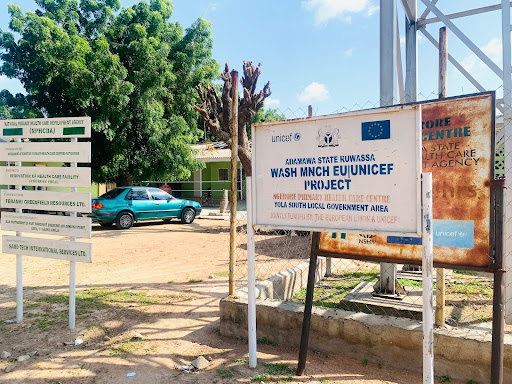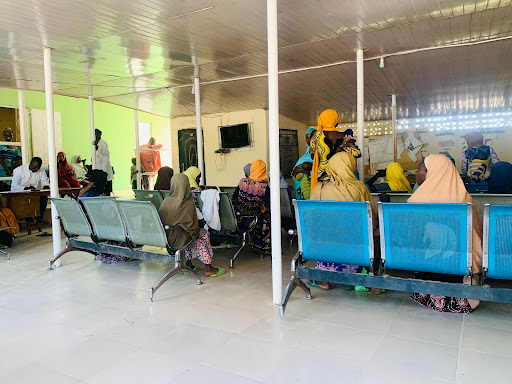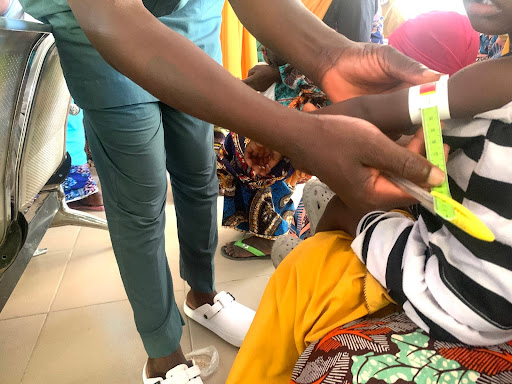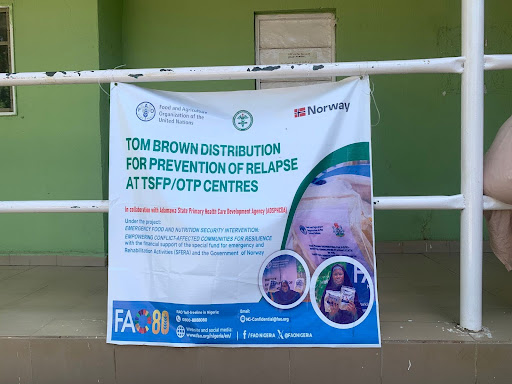Aid Draught, Stolen Supplements: The Child Malnutrition Crisis in Nigeria’s Adamawa State
As international aid dwindles in Nigeria, malnourished children in Adamawa State are left more vulnerable. With issues like inflation and poverty, some parents are forced to make heartbreaking decisions.

It is July 18, around 7 a.m., and a group of women carrying malnourished children are gathered at the primary healthcare centre in Adamawa State, northeastern Nigeria, to receive free supplements for their children. While waiting for the weekly distribution to commence, they interact with one another.
Moments later, a healthcare staff member in a white uniform with a blue check yells from the opposite direction: “There is no RUFT supplement today. Go home and come back next week.”
Disappointed, the women place their babies on their backs and disperse in different directions.

Twenty-three-year-old Aisha Adamu, a resident of the Ngurore community, where the primary healthcare centre is located, is one of the women who are returning home without the supplements. Aisha relies on the RUFT supplement as a primary meal for her malnourished daughter.
“She has been suffering from malnutrition since she clocked 1 year. I have seen improvement since I started feeding her the supplement,” Aisha tells HumAngle. She is devastated because she has to look for an alternative meal for her malnourished baby, as the facility is facing a shortage of RUFT supplement.
Ready-to-Use Therapeutic Food, also known as RUFT, is an essential supplement used for treating malnourished children under the age of five. RUFT paste consists of powdered milk, peanuts, butter, vegetable oil, sugar, and a mix of vitamins and minerals. A sachet contains 500 calories and micronutrients.
The crisis

In 2023, the United Nations Children’s Fund (UNICEF) reported that growing inflation, climate change, insecurity, and displacement impacted child malnutrition in Adamawa. That year, about half a million children were treated for acute malnutrition in UNICEF-supported facilities in Adamawa, Borno, and Yobe states. The number reflected a 37 per cent increase from 2022, highlighting how severe malnutrition was endangering children’s survival and development in North East Nigeria.
Ngurore, a community in Yola South, grapples with a severe child malnutrition crisis. The community hosts victims of displacement from the Michika and Madagali Local Government Areas (LGA). The primary healthcare centre in Ngurore offers clinical services to residents, the displaced population, and people from outside the community.
To address the malnutrition crisis, organisations such as the Helen Keller Foundation, UNICEF, USAID, and MSF are collaborating with primary healthcare facilities, offering free health screenings and providing RUFT supplements to malnourished children.
Ahmed Mshelia, the data clerk at the Ngurore primary healthcare centre and one of the key facilitators of the malnutrition unit, expressed concern over the soaring malnutrition cases in the facility. Ahmed is not sure whether the centre can handle the number of people relying on it for aid.
“Apart from residents of Ngurore and the IDPS living here, we also have women from Fufore and sometimes Numan LGA coming here to collect free supplements for their malnourished children,” he said.
The facility attends to malnourished children every Friday.
“So we have new cases and then revisit cases. The new cases come to register for the first time, while the revisit cases have already been registered, so they turn up weekly for the supplements,” he explained, noting that the facility records an average of five to six new cases weekly, which puts it at 20 to 22 new cases monthly; so far, there are over 50 revisit cases. “We refer severe cases to bigger hospitals.”
At the centre, the RUFT was distributed according to each child’s weight. If available, the women could go home with at least 14 sachets every Friday. Aisha Abdullahi, a 38-year-old mother, received at least 14 sachets of RUFT supplement each week for her daughter, who is one year and ten months old. Aisha set aside two sachets for each day, ensuring that the 14 sachets would last her daughter for the entire week.
“I feed her with the supplement twice a day, morning and evening, then complement it with any available food,” she told HumAngle.
In February, Felix Tangwami, Adamawa State’s Commissioner for Health and Human Resources, noted in a report that insecurity accounts for the high malnutrition rates in the state as farmers have limited access to their farms, which, in turn, results in reduced food availability.
Parents of malnourished children in Fufore told HumAngle that inflation is the primary cause of malnutrition in their community, as their husbands can barely afford three meals a day for their households.
Ahmed stated that many women who visit the centre lack sufficient breast milk, a situation he attributed to poor feeding practices, which consequently impacts the health of their children. For Amina Abdullahi, a 35-year-old mother of six from Ngurore, the primary healthcare centre is assisting her 2-year-old twins in overcoming malnutrition. In addition to the twins, she has another son at home who is also malnourished.
Amina registered the three children at the facility in February and has seen improvement in their weight. However, with the shortage in RUFT supply, she’s worried about their recovery process, which seems to be taking too long. According to Ahmed, the RUFT treatment is expected to run for eight weeks nonstop, but right now, it’s impossible to stay on track as parents struggle to keep up due to inconsistent supply. He explained that the women get the RUFT supply for at least four weeks out of the required eight.
Amina expressed concern over the country’s inflation rate. The ongoing shortage of RUFT supplies leaves her anxious about feeding her malnourished children due to insufficient food at home.
“Feeding is difficult compared to the past. Everything is now expensive, but we thank God for everything,” she said.
Less aid
In May, HumAngle reported that the withdrawal of humanitarian agencies dependent on USAID funding in Nigeria affected displaced populations relying on them for essential services. This suspension was said to have deepened the humanitarian crisis in the northeastern region.
The primary healthcare centre in Ngurore, which previously collaborated with agencies like USAID, is now feeling the impact of their withdrawal as the child malnutrition situation in the region is worsening.
Ahmed explained that the facility’s aid from civil society groups has significantly dropped this year compared to previous years. For example, the primary healthcare centre, which used to receive hundreds of RUFT cartons from UNICEF, now gets only about 30.
As a result, the facility now distributes the supplements bi-weekly, unlike in the past when they were shared weekly.
“The supplements are scarce, and it is required that the children keep up with the treatment once they start, but due to a shortage in supply, we sometimes skip a week or two in distribution, which affects their recovery,” Ahmed noted.
He added that in the past, the organisations the clinic partnered with not only gave RUFT supplements to the malnourished children but also provided complementary drugs. “They give them deworming tablets like albendazole and sometimes malaria tablets and even distribute free test kits.” The situation has changed, as they only get RUFT supplements, and even the supplements are scarce. “We try our best, and if there’s a constant supply of commodities, then we won’t have problems catering for the children.”
Ahmed is worried about the recovery of the children, stressing that since aid is shrinking and RUFT supply has declined, he had advised parents of the malnourished children to augment the supplement with other complementary meals.
HumAngle spoke with Umeh Chukwuemerie, a medical officer in the department of pediatric surgery from the Moddibo Adama University Teaching Hospital, Yola. He explained that children under the age of five require good food to develop their brain and motor skills.
“The child is growing, so he needs all the nutrients he can get to be fully developed because this is the stage where he is rapidly growing and his brain is still developing,” Umeh said. He stated that once malnutrition sets in, continuous treatment is crucial; otherwise, the affected child will become stunted, more susceptible to other diseases, and may develop poor social skills that might affect their confidence in the long run.
Trading hope
In 2022, HumAngle reported the abuse and sale of RUFT supplements in Maiduguri, Borno State capital, at the price of ₦150 per sachet. The reports showed how parents went as far as inducing their children with portions to pass watery stool, which makes them shed weight and then qualify them to obtain the supplements that they [parents] end up selling.
This sale of RUFT supplements, though fueled by poverty, has been termed illegal.

Amidst the scarcity, HumAngle found that some of the women in Adamawa also end up selling the supplement they get to local traders due to pressing hunger in their households.
In front of an old motor park known as Tashan Njuwa in Numan LGA, *Babagana balanced his wheelbarrow at the Park’s entrance, where he displayed his wares. Among the biscuits, sweeteners, and other items he was selling, there were scattered sachets of RUFT supplements.
When asked for the price, he said, each sachet costs ₦400. According to him, he buys a sachet at the price of ₦300 from his suppliers and then sells it to hungry adults for ₦400, making a profit of ₦100.
As Babagana explained, these suppliers are women who receive the supplement for their malnourished children from centres specialising in child malnutrition care across the state. However, he revealed that some healthcare workers sometimes bring the supplement to him.
He has been selling RUFT supplements for over two years now, and while business has boomed in the past because he sold about 30 pieces or more in a week, the suppliers have barely shown up lately.
“I heard that there is scarcity, and the ones I have will soon finish, but I might get some in the coming week,” he said, stressing that his RUFT customers are mostly older people. “They buy it as a quick meal. Then they mix it with boiling water and take it as pap.”
However, Umeh insisted that malnourished children require the RUFT supplement the most, and there is no medical explanation for adults taking it. “It is not supposed to be sold commercially. RUFT is sent directly to primary healthcare centres but ends up in the wrong hands sometimes, which is sad,” he said.
Ahmed added that some of the women in the community gather the supplements and sell them in large quantities while others sell one at a time. “We hear them whispering amongst themselves sometimes,” he revealed, stating that some women sell half of what they receive weekly at the healthcare centre and use the remaining half to feed the malnourished children.
“When we tried to sensitise them on why they shouldn’t compromise on their children’s health one time, a woman explained that ten sachets fetched her ₦4,000 at ₦400 each, which she used to procure rice, beans, and other groceries that fed the whole family for a couple of days.”
While he’s aware of the food scarcity and inflation in town, Ahmed urges the women to desist from selling supplements, as this hinders the quick recovery of their children, especially at a time when aid is declining.
While RUFT is currently scarce, organisations like the Food and Agriculture Organisation (FAO) of the United Nations, with support from the government of Norway, are stepping up with alternative supplements like Tom Brown, a locally produced flour mixed with grains to prevent relapse in the malnourished children of the Ngurore community.
“Distribution will start soon, and we are grateful. However, I fear that they might start selling this one too,” Ahmed said.
Amid a growing malnutrition crisis in Adamawa State, Nigeria, women gather at a primary healthcare centre in Ngurore for RUFT supplements, vital for their children's recovery.
Due to aid withdrawal and reduced supply from agencies like UNICEF, the distribution of these supplements has been cut back, worsening the situation for malnourished children. The centre prescribes RUFT based on each child's needs, but supplies often fall short, causing many mothers to find alternative food sources. Compounding this are reports of RUFT illegal sales, driven by severe poverty and hunger.
Healthcare officials express concern over dwindling aid, which has resulted in inconsistent product availability, hindering recovery. While organizations like FAO plan to introduce alternative supplements such as Tom Brown flour, there are fears they might also be subject to illegal trade.
The urgent need for consistent aid, alongside the importance of safeguarding children’s health over immediate financial relief, remains a pressing issue in the fight against child malnutrition in northeastern Nigeria.
Support Our Journalism
There are millions of ordinary people affected by conflict in Africa whose stories are missing in the mainstream media. HumAngle is determined to tell those challenging and under-reported stories, hoping that the people impacted by these conflicts will find the safety and security they deserve.
To ensure that we continue to provide public service coverage, we have a small favour to ask you. We want you to be part of our journalistic endeavour by contributing a token to us.
Your donation will further promote a robust, free, and independent media.
Donate HereStay Closer To The Stories That Matter




